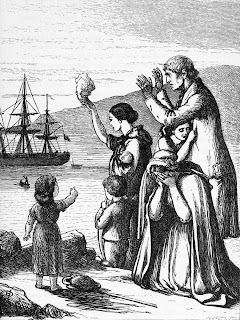People don’t pick up and leave home unless driven by a need more powerful than the natural love of all things familiar. Poverty, hatred, fear, desperation, the yearning for a better life—these are natural sources of tension and drama. As Marion O’Shea Wernicke discusses in our New Books Network interview, she found inspiration in her grandmother’s story. Read on—and listen—to find out more.
As always, the rest of this post comes from New Books in Historical Fiction.
Most people have heard of the Irish famine in 1848 and of the resistance movement against British sovereignty that consumed much of the twentieth century. In this attempt to understand her great-grandmother’s life, Marian O’Shea Wernicke examines the years between the famine and the Easter Rebellion of 1916. In the process, she creates a compelling tale of a young Irish girl, Mary Eileen O’Donovan, whose impoverished family forces her to marry a neighboring farmer in his forties when Eileen, as she’s known, has barely passed her sixteenth birthday.
In material terms, it’s a good match, but it is not what Eileen wants from life. A bookish girl, she has ambitions of studying to become a teacher, but pressure from her family puts paid to those plans. Eileen grudgingly agrees to wed John Sullivan and does her best to make him a good wife. When she becomes pregnant, the couple’s newborn son unites them for a while, but John’s morose nature and frequent drunkenness make him a difficult man to love, especially for an idealistic girl.
When the crops fail and Eileen’s younger brother falls foul of the Fenians, Eileen and John decide their only choice is to emigrate. But leaving Ireland turns out to carry a high price as well …


No comments:
Post a Comment
Ideas, suggestions, comments? Write me a note. (Spam comments containing links will be deleted.)